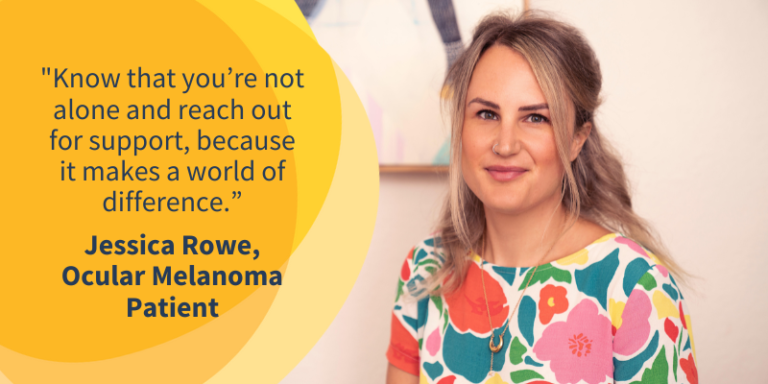At 25, Jess was living her best life. It was 2007 and the young advertising professional had moved to London, where she balanced her burgeoning career with an active social calendar. But Jess’ life was thrown into disarray when her father suddenly passed away from cancer.
“It was devastating. My dad was fit and healthy, so it came as a huge shock. There was so much to process and realise he was never coming back – the finality of his passing was overwhelming. So, I took a break from ‘real life’, left my job, and bought a ticket to Greece to live in the Mediterranean for a few months,” Jess said.
It was while on this much-needed vacation that Jess started to experience a flashing white light in her right eye. Putting it down to a temporary side effect of spending too much time on bright, sunny beaches, she made a note to wear sunglasses and a hat every day and didn’t think too much more of it.
A shock diagnosis - choroidal melanoma
But when the flashing persisted for seven days and began to change colour, Jess went to an optometrist who diagnosed her with a detached retina.
“I went to the hospital in Athens soon after, ready to have my retina reattached so I could continue my trip. But a pre-op scan revealed that my problem was much bigger and scarier than a detached retina. The strange flashes I was seeing were the result of a choroidal melanoma.”
Still reeling from the shocking diagnosis, Jess rushed back to Australia for urgent brachytherapy, or plaque-therapy, treatment in Melbourne.
“Getting that diagnosis so soon after losing my dad to cancer was shocking and filled with fear – particularly as there was very little information at the time about ocular melanoma. I was so naïve too; I didn’t even know you could get cancer in the eye. Fortunately, after a few months the treatment was deemed a success so I could put the whole thing behind me and move on.”
Nine years later, one of Jess’ regular ultrasounds delivered a crushing and unexpected blow. Her cancer had returned, metastasising in her liver. Despite having the two lesions surgically removed and undergoing immunotherapy, two years later another four metastases were discovered.
“I was feeling great, so it was a brutal punch to learn it was back – again! I couldn’t believe it. All that old trauma and anxiety was reopened and without the support of my boyfriend, family, friends and medical team, I don’t know how I would’ve got through it.”

Tebentafusp - a life-saving treatment
Jess was eligible to receive an innovative treatment, Tebentafusp. In fact, the treatment was so new that Jess was the first person in Victoria to receive it outside of a clinical trial.
“I had a very strong and uncomfortable physical reaction to Tebentafusp. But once it settled down, my body responded well. I now have treatment weekly, which has halted the growth of my metastases and my prognosis (and head space) is much more positive. I’m just incredibly grateful – and lucky – that I was able to access this life-saving treatment.”
“Sharing my experiences with other ocular melanoma patients – or ‘ommies’ as we call each other – has really helped me process it all. There’s such a fantastic and collaborative community out there who share information and offer wonderful support. Plus, organisations like AOMA, whose Summit I had the privilege of speaking at this year, have been a game changer for giving people assurance and hope that treatments are out there.”
Jess’ advice to anyone going through an ocular melanoma diagnosis?
“Know that you’re not alone and reach out for support, because it makes a world of difference. Whether it’s a partner, family member, friend from work, or anyone – you’ll need someone in your corner to vent or cry to when things get tough. Try your best to enjoy life’s little moments too, like watching a movie with a loved one, a morning stroll with your dog, or eating something delicious. And don’t sweat the small stuff – it just isn’t worth it.”
Watch Jess’ talk about her experience with ocular melanoma and Tebentafusp at the 2022 AOMA Summit.

